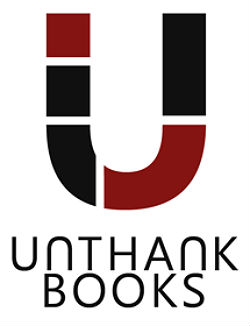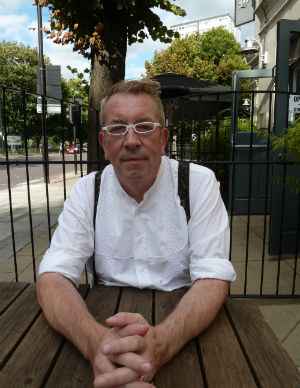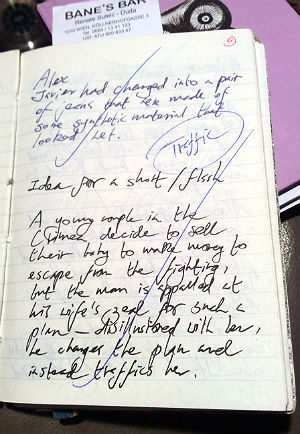Short Stories:
Featuring the accompanying post:
Quick links on this page:
'Traffic' is a short story written by Nick Sweeney. The storycame runner-up in the 2015 V.S. Pritchett Memorial Prize, run by The Royal Society of Literature.

Nick's story is being published in the next Unthank Books Untology later in 2016. Unthank Books have kindly given me permission to publish an extract of the story as part of this post.

Nick has written an accompanying post which includes details of his experiences of attending the competition award ceremony and speaking with the judges. It makes a very interesting read.
If you have experienced success in short story competitions or have been published through a short story magazine and would like to write about your experiences for my website, please read my submission guidelines page and get in touch.
The music was part of her neighbours the Obuchovskis’ stepping-out ritual, and it seemed to Svitlana as if it went on for hours. They drank, thumped feet to the beat as they showered and dressed, shouted down their phones to make arrangements. Svitlana could almost see that slut Obuchovska with her back-combed bird’s nest, exaggerating her eyes with mascara in the mirror. They would go out into Kiev, even as it flooded with demonstrators and burned, its streets blocked off by police. They'd drink more, drink heavier, listen to louder music, thump those feet harder, dance. They’d come in at four, put even more music on, shout at each other, throw things, call more friends, or they’d make love loudly, growling and mewing. Svitlana’s baby would wake again, and cry again.
That was how it started, Svitlana thought. She remembered doing the hair, listening to the music, at home, in the bars, in the clubs, doing the mewing and growling; that was the part that had produced the baby, of course. No more fancy hairdos for her – no point – and the jewellery, the leather jacket, the boots, nobody looked at them or cared about them when all she did was wear them up and down the road to the shops with the baby. The luscious mommies could dress themselves up all they liked, go to the gym with the crèche in it, drink the cappuccinos, kid themselves all they liked that they were living the life, but they weren’t; they were just women who tended to babies, like her.
And they didn’t fool her. They wanted to get rid of their babies. Just as she did.
END OF EXTRACT
The full version of Nick's story is currently available to read in full on the Unthank Books blog

Nick Sweeney’s short stories have been published in Ambit, Eunoia Review, In-flight, Writing Raw and other magazines. Laikonik Express, his novel about friendship, Poland, snow, vodka, and getting the train for the hell of it, was published by Unthank Books in 2011. Much of his work reflects his fascination with Eastern Europe and its people and history.
Nick lives in London and works as a freelance writer, editor and musician. His short story ‘Traffic’ was runner-up in the 2015 V S Pritchett Memorial Award. Have a look at his website The Last Thing the Author Said, where you can find more than any sane person would want to know about him, but also other short stories, extracts from Laikonik Express, peeks at his works in progress and details of his musical adventures with the Trans-Siberian March Band.
I’d not been a great fan of writing competitions until recent years, for various reasons. Part of my thinking was on the lines of, Why tie up a good story in the process of a competition, which may take months, when I can just send it to a magazine and, if it’s not accepted, send it to another, until it is?
I revived my interest a few years back. I had (and still have) a story I thought perfect for a particular competition. It didn’t get anywhere, but no matter. I’d been bitten. I’d simply discerned the idea of stories ‘suitable’ for competitions, and those that weren’t. I’d heard of the V S Pritchett Award, somehow, and entered Traffic into it.
Hearing about opportunities to publish or compete doesn’t just happen. I subscribe to several newsletters that keep me up to date with everything that’s going on.
Between them, these sites will probably have every possible opportunity covered, from tiny minority-interest online mags to venerable printed journals to high-profile competitions, such as the Bridport Prize. 75% of the opportunities they publicise won’t be exactly appropriate – I often think, What, this mag really wants stories featuring only disabled Welsh elephant trainers in Brooklyn after an ecological disaster? – and you have to sift through them all to find something that suits your work. I’ve not yet been tempted to write the post-apocalyptic disabled Welsh elephant trainer story… but you never know.
Facebook groups also provide a platform to discuss upcoming openings and competitions. Once you’ve found a competition that may be right for your story, it’s time to make a note of seven essentials. They’re all easy to follow:
All straightforward, all obvious, and yet submitters ignore them all the time, apparently. Competition organisers list all their rules in earnest, and ignoring any of them will ensure that your entry is binned before the initial judging stage.
To my mind, to have a chance of winning theme-unspecified competitions, a story has to have at least these two elements:
And also (optional, maybe) some element that reflects the society around us in some way. This can be effected even if the story is set in the past or future, one example being Star Wars:
An oppressive empire threatens far-flung desert people, and gets its come-uppance in various ways, a story that goes back through the ages
Does that sound familiar? Could it relate to various scenarios in the current wars raging in the Middle East and beyond? Some readers may see exact parallels, some only a hint, but it appeals to them just the same.
The usual features of any coherent story will apply with regard to character, maintenance of tension, lack of clutter, plausible dialogue, clear paragraphing, an appropriate choice of vocabulary – all those things that a good writer takes for granted, and yet still forgets. I know I do.
A good story is a thoroughly edited one. I cringed when I realised I’d used the word 'phase' instead of 'faze' in the first sentence in a story I sent to one competition. One error like that wouldn’t necessarily lose you a prize if the rest of it was great, but it may well prejudice an overworked judge who just wants to be done with it all for the day.
Gain some, borrow some, adopt some – assume, or pretend, some. Every writer should be an authority on their subject. What I mean is that if you’re going to write about people caught up in conditions in a certain time and place, you need to know all you need to about them. You don’t have to use it all in your story – in fact, showing off the research often ruins an otherwise good yarn (see Birdsong, by Sebastian Faulks – Tunnels, specifically).
My authority with regard to the themes in 'Traffic' is that, though I’ve never been to Ukraine, I travelled in Eastern Europe from 1990 onwards, lived in Poland for 4 years in the 90s, and continue to visit Eastern Europe. Crucially, I also maintain an interest in its cultures, peoples, politics, music and history. Of course, an all-round fiction writer should also be prepared to just make stuff up, which I also do – but it still needs to convince the reader of its authority.
John Le Carre said that having worked in the British Secret Service didn’t help his spy novels in terms of the procedures; he said if he’d included the actual procedures, he’d bore his readers to death. He convinced his readers of the world he was depicting because he was confident in his authority, backed up with the knowledge of what he was leaving out.
I didn’t do much for this story. I know a lot about people trafficking in Eastern Europe just from reading news reports and watching TV documentaries, feature films like Lilya For Ever, and, more recently, a sub-plot in The Wire, and a story, or two, in the Arne Dahl Swedish crime series. Unfortunately, it’s a plague that is always with us, and people are trafficked, for various reasons, from all the further countries of Eastern Europe – certainly Poland, Ukraine and Russia. I’d have been less certain if I’d had to, for some reason, set Traffic in Hungary or Romania. I know both countries well, but not their reputations for this particular crime. In that case I would have looked up some stats and, possibly, would have had to account for them in some way in the story. I feel that, unfortunately, I can simply state that trafficking happens in a place like Ukraine, and it’ll be immediately plausible.
I did a little research on names. Some Ukrainian names are particular only to Ukraine – any name ending in ‘enko’ – while some are interchangeable with Russian and Polish names due to the nature of Ukraine’s borders, the hosting of large Polish and Russian communities, and past occupation by the Soviets, including some long periods of the Russians importing forced labourers in from places like Uzbekistan and Turkmenistan, plus colonies of Tartars. I found that there are some changes to the Russified names I’m familiar with. Vladimir is Volodimir in Ukrainian, for example, and the name usually written (in our Latin alphabet) as Svetlana is usually rendered as Svitlana. I gave the Obuchovskis a name that could be either Russian or Polish or Ukrainian. That was about it for research.
Does Kiev have power cuts? I assume so. A Kievite might read my story and say proudly that Kiev has never suffered a power-cut, even through its years of rioting and violence. But so what? Power cuts, in such times, are plausible. I experienced them all the time when I lived in Istanbul, and on a recent trip to Georgia.
Would men be foolish enough to rob a corner shop with guns, all for the theft of something trivial? Yes, for sure, and this happened while I was living in Poland in the 90s, and made the news in a three-line short – almost too foolish to be true. All the same, it’s fiction. It doesn’t all have to be true to be plausible.
It’s probably not that helpful to say, "I just thought of it," but in this case, I did. I got the idea for the story all at once. I’d not been thinking about writing a story either about trafficking or set in Ukraine. At least, not consciously. I wrote it down at once in one slightly rambling sentence in a notebook – I have a notebook with me wherever I am.
The premise was that a young woman wants to get rid of her baby, so what could possibly go wrong? I knew exactly the way it was going to go. Extra details, such as the scene with the men with the guns in the corner shop, occurred to me later. It struck me that times of civil strife allow countries to be flooded with guns, which lend a scary edge to idiots who would otherwise just have been laughable.
I wrote 'Traffic' in one sitting; a scrappy draft by hand in a notebook.

Four or five drafts on the computer got it into proper shape. I nearly always just let rip in the first computer draft – too many adverbs, adjectives, rambling sentences, loose dialogue, self-indulgent ‘author-ish’ imagery – then clean it up later. I’d like to think I’m getting more self-disciplined at this stage, but I think sometimes you can lose the spontaneity if you’re thinking too much about the mechanics of ‘good writing’.
I’m afraid I can’t really answer this question in any way that will satisfy most readers. The judges were disappointingly gracious about the process, so I’m inferring a scenario from some of the numbers involved.
There were more than 700 entries. The preliminary readers – on the staff of the Royal Society of Literature – narrowed them down very quickly to a short list in single figures, which is astonishing. I couldn’t gauge from them whether this is usual or not, but I gather the practice is to present the ‘name’ judges with as little to do as possible in terms of quality control.
The panel judges were writers Rose Tremain, Philip Hensher and Adam Mars-Jones. They reduced the shortlist to six almost immediately, then to two. I was slightly shocked at the rate of attrition that brought 700-odd entries down to single figures so quickly. My impression was that the bulk of them had flaws that stuck out at once to the preliminary readers. Assuming they were within the word-count and got there on time, I have to assume that their flaws were serious enough to be discounted almost immediately.
The winner, Jonathan Tel, is based in the US, so couldn’t come over for the awards. He missed a top night out at a restaurant in London’s West End with the judges and the RSL director and staff. It was great to be able to talk to them – Rose Tremain is one of my favourite writers, and I had to be careful not to gush about her work to her; she made it clear that I was the one we’d talk about (in the absence of Jonathan Tel).
When asked about the judging process, disappointingly, the judges said things like, "You get a feel for a good story in the first paragraph," which is fine, but not very helpful.
They said they knew what they liked when they saw it. Two of them expressed disaffection with straightforward genre fiction and, while recognising that it was good in its own way, suggested that as one reason for the dramatic plunge in numbers to the shortlist (or at least nodded when I suggested it, to be honest). So I guess it’s risky to send a purely genre-fiction tale to a competition. If that genre doesn’t appeal to the judges, it probably won’t get anywhere, even if it’s well written for the genre.
One judge recounted the tale of a novelist on the panel of a competition who began to notice that a few of the short-listed stories were pastiches of his own work. He was flattered, slightly, and then annoyed at the transparency of such a trick. So I came away with at least two ‘don’ts’.
The ‘do’s’ rested in a familiar list of clarity of theme and a snappy intro that will get a judge interested. Remember, in a short story you have to cut to the chase quickly, especially in a competition. So, back to those general rules of good writing. I’ll be keeping them closely in mind. After all, I’ve still never won a competition.
There is an audio file discussion by the three judges on the short story, which took place just before the presentation. They talk about what they expect from a short story and give some advice to short story writers. It’s very informative. I think I was probably too nervous / starry-eyed to listen to it carefully while it was going on, only yards away.
Nick Sweeney, March 2016
Every guest writer brings new advice to the blog, which gives all the readers (including myself) new real-life success tips to learn from. I'd like to say a huge 'thank you' to Nick for being such a legend and sharing his experiences so candidly.
If you have had a short story published and you would like to share your experiences with my readers, please take a look at my submission guidelines.
Maggie M
Hi Christopher & Nick, thank you for an interesting article.
Steph M
Cheers Chris & Nick - some interesting stuff there
.
Chris Fielden
Thanks Maggie & Steph :-)
Debbie B
A very interesting article, Nick - thank you.
I've read a lot of advice online saying you should read back issues of competition anthologies and magazines that you intend to submit to. Do you undertake this practice (and did you for the VSP Memorial prize)? Or do you think a good story can win a competition regardless?
Nick S
Thanks, Debbie. Glad you enjoyed it.
In an ideal world, it wouldn't do any harm to get a flavour of what your judges are looking for, but in the case of competitions like the VSP Award, the brief for stories is so vague, and each judge instructed to go with what they feel, it probably wouldn't make much difference. I didn't seek out the previous years' winners for the VSP Award. In competitions with narrower guidelines - I can't think of any at the moment - it would be a good idea to look up some stories. In theory, a good story can win - but it's up against other good stories, and that's where luck, and the judges' preferences and peculiarities, and their criteria for what constitutes 'good', come in. As stories are much more available these days - winning authors often put their stories on their websites once a print issue has run out of interest - there's no excuse not to check, really.
Magazines are a different thing, and in my opinion it's essential to take the trouble to read an issue and see what editors are after. I know from editors of magazines that have published me (Ambit and Eunoia Review) that much of what they reject isn't bad, as such; it just doesn't fit in with the feel of the magazine. Many mags are available as samples online, or are cheap and easy to download, so there's no excuse not to, really, and it's a good way to give yourself more than a fighting chance.
Lou N
Chris, I enjoyed this very much.
I’ve just sent a new story to the Glimmer Train competition. Wish me luck!
Chris Fielden
Thanks Lou, glad you liked it. Good luck with Glimmer Train :-)
Mark G
Thanks to Nick Sweeney for a snappy, informative and entertaining piece about the trials and travails of submitting short stories - never mind writing the little devils.
Loved the mention about phase/faze. I discovered a typo in the first paragraph of a short story I'd written and which I had for years - years - submitted to various competitions. Ow.
I also discovered late on in the writing of a novel that I had written 'taught' several times when I should have written 'taut'. Painful, painful cringe.
One more thing that might help writers when proofing their stories - after I've proofed it a couple of times in WORD, I save it in PDF format and then read it. I don't know why, but I tend to find errors, typos, that I otherwise miss during the WORD format proofing.
Chris Fielden
Thanks for commenting, Mark. Wise words. I agree regarding Word.
I find the best way to spot typos is on paper. I go medieval, print the story out and make edits / notes using a pencil. For some reason, I find errors are easier to spot on paper - no idea why...
Nick S
Thanks for your comments, Mark.
The process of making myself cringe with the odd typo goes on, of course. It's not exactly a bad thing. I look upon it as a sign that I'm getting on and doing the writing, and not pondering each word unduly long - that comes later.
One observation: if you're using an adjective like taut more than once or twice, even in the length of a novel, it's probably too often. It's a word that stands out a lot to signify tension, so should maybe be used more sparingly. I once edited a client's novel which had the phrase 'Her eyes were moist' 11 times - that figure has stuck in my mind, though it was years ago. He seemed very attached to the phrase, said it was one of his heroine's 'characteristics'.
I'm with Chris on editing: the only way to do it is via hard copy. I work as a professional editor, and this has been my habit for years, and one I've insisted on with fellow-editors if I do the odd bit of project management. Luckily, printing and paper costs are far less these days than they used to be.
Good luck with your work, Mark.
Leave your comments
Please use the form below to leave your comments. All comments will be reviewed so won't appear on the page instantly. I will not share your details with anyone else. Most recent comments appear at the bottom of the page, oldest at the top.